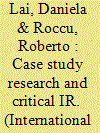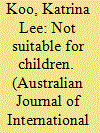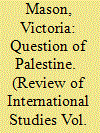|
|
|
Sort Order |
|
|
|
Items / Page
|
|
|
|
|
|
|
| Srl | Item |
| 1 |
ID:
164835


|
|
|
|
|
| Summary/Abstract |
Discussions on case study methodology in International Relations (IR) have historically been dominated by positivist and neopositivist approaches. However, these are problematic for critical IR research, pointing to the need for a non-positivist case study methodology. To address this issue, this article introduces and adapts the extended case methodology as a critical, reflexivist approach to case study research, whereby the case is constructed through a dynamic interaction with theory, rather than selected, and knowledge is produced through extensions rather than generalisation. Insofar as it seeks to study the world in complex and non-linear terms, take context and positionality seriously, and generate explicitly political and emancipatory knowledge, the extended case methodology is consistent with the ontological and epistemological commitments of several critical IR approaches. Its potential is illustrated in the final part of the article with reference to researching the socioeconomic dimension of transitional justice in Bosnia and Herzegovina.
|
|
|
|
|
|
|
|
|
|
|
|
|
|
|
|
| 2 |
ID:
127068


|
|
|
|
|
| Publication |
2013.
|
| Summary/Abstract |
The 2001 conflict in Afghanistan has attracted a great deal of international controversy. The impact of the conflict on Afghanistan's children has been no exception. The research conducted by the United Nations and child protection organisations on the experiences of Afghan children throughout the conflict paints a bleak picture. Accounts of children being directly targeted, accidently killed, abducted, actively fighting in armed groups, denied humanitarian assistance or simply struggling to be healthy, happy, educated and secure amid this conflict are a reminder that conflict devastates children's lives. However, while this research demonstrates that children are often war's innocent victims, the ways in which this research is narrated, particularly by belligerent parties to the conflict, are far from innocent. This article examines the political manipulation of research on Afghan children affected by armed conflict. It argues that Afghan children and their experiences have become a powerful moral symbol that is used by belligerents to advance political, military and strategic agendas.
|
|
|
|
|
|
|
|
|
|
|
|
|
|
|
|
| 3 |
ID:
179322


|
|
|
|
|
| Summary/Abstract |
While the gravity of the injustice and inequality experienced by Palestinians is now widely documented, evidenced, and acknowledged, when it comes to action the situation appears ‘impervious’ to international law and norms of global politics, with Israel largely enjoying impunity. This article argues that this state of affairs can be most coherently understood through a critical interdisciplinary emancipatory framework centred on ‘liminality’. Referring to situations and actors ‘betwixt and between’, the framework of liminality offers significant potential for understanding how particular actors and spaces are intentionally marginalised, disempowered, and silenced within global politics and international law. Furthermore, in revealing the root causes of liminality, and the inherent vulnerability of such spaces to contestation and subversion, the framework also opens up potential pathways of transformative emancipation. Applying the lens of liminality to Palestine, it is demonstrated that Palestinians have been deliberately corralled to a liminal space within international law and global politics in order to enable an expansionist Zionist/Israeli settler colonial enterprise. After exploring how Palestinian liminality manifests in global politics and international law, the article turns to a range of efforts to subvert Palestinian liminality and assesses prospects for a teleological emancipation for Palestinians.
|
|
|
|
|
|
|
|
|
|
|
|
|
|
|
|
|
|
|
|
|